Observing the Sun
H alpha
In addition to observing
the Sun in white light, by the use of special filters it is possible
to observe the Sun's chromosphere. This requires a very narrow
bandwidth filter centered on the Hydrogen Alpha spectral line
- 6562.8 angstroms. The two main suppliers of these systems are
Daystar & Coronado. I myself use a Daystar ATM filter at 0.7
angstrom which allows views of prominences and some disk detail.
The only drawback to the filter is that the optical system should
be running at f30 to operate correctly. The Daystar filters are
a combination of Energy Rejection Filter and a temperature controlled
filter which is accurate to 0.5 of a degree. This f30 can be achieved
by using an aperture reduction mask, or a combination of reduction
mask and Barlow Lens.
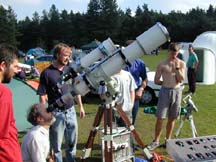 . .
. . 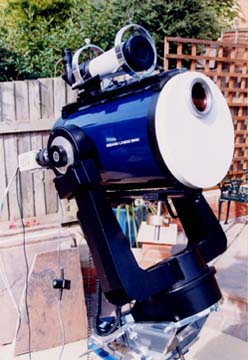 . .
. . 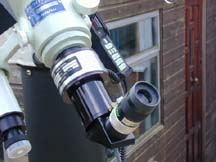 Above images show Daystar
filter on Takahashi FS128 with central ERF, the LX200 with off
axis ERF, and the business end of the Daystar filter.
The images seen through
the Daystar filter are bright red, though you can also pick up
some fine detail by converting the image to monochrome using a
video camera or digital camera. A video camera is very good in
reducing the brightness and increasing the contrast to bring out
some more of the Sun's surface detail. Of course a 35mm camera
can be used with varying exposures, bracketing to get the best
shot.
Above images show Daystar
filter on Takahashi FS128 with central ERF, the LX200 with off
axis ERF, and the business end of the Daystar filter.
The images seen through
the Daystar filter are bright red, though you can also pick up
some fine detail by converting the image to monochrome using a
video camera or digital camera. A video camera is very good in
reducing the brightness and increasing the contrast to bring out
some more of the Sun's surface detail. Of course a 35mm camera
can be used with varying exposures, bracketing to get the best
shot.
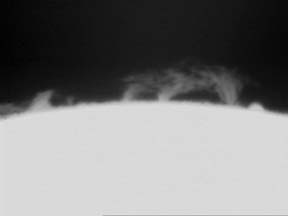 . . . . . .
. . . . . . 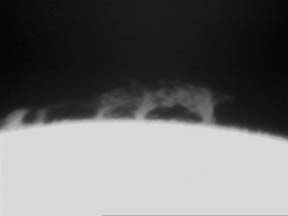 Two H alpha video images
captured about 1 hour apart - some slight changes are visible
in the prominences. LX200 and Astrovid 2000 captured with a Neotech
card.
Two H alpha video images
captured about 1 hour apart - some slight changes are visible
in the prominences. LX200 and Astrovid 2000 captured with a Neotech
card.
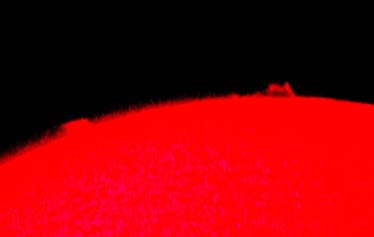 H alpha image captured
using an 10" LX200 SCT and 35mm Camera at prime focus.
H alpha image captured
using an 10" LX200 SCT and 35mm Camera at prime focus.
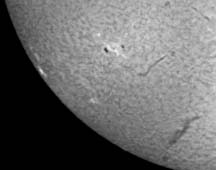 . .
. . . .
. . 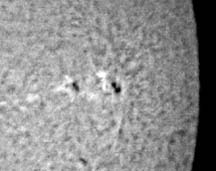 Surface detail and
prominences. Monochrome images.
Using conventional
digital cameras such as the Nikon Coolpix pointed down a large
eyepiece such as a 31mm Nagler can generate some quite pleasing
images. The ones below were taken through a Takahashi FS128.
Surface detail and
prominences. Monochrome images.
Using conventional
digital cameras such as the Nikon Coolpix pointed down a large
eyepiece such as a 31mm Nagler can generate some quite pleasing
images. The ones below were taken through a Takahashi FS128.
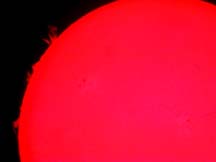 ....
.... 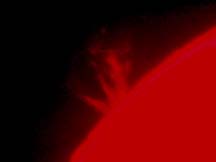 Further
equipment developments on the Solar & H alpha front
Latest Hi Resolution H alpha Images - New
H alpha animation sequences - New
Observations of the Sun in White Light
Observing
of the Sun
Total Solar Eclipse Observations
Astronomy
Main . . Home
Further
equipment developments on the Solar & H alpha front
Latest Hi Resolution H alpha Images - New
H alpha animation sequences - New
Observations of the Sun in White Light
Observing
of the Sun
Total Solar Eclipse Observations
Astronomy
Main . . Home